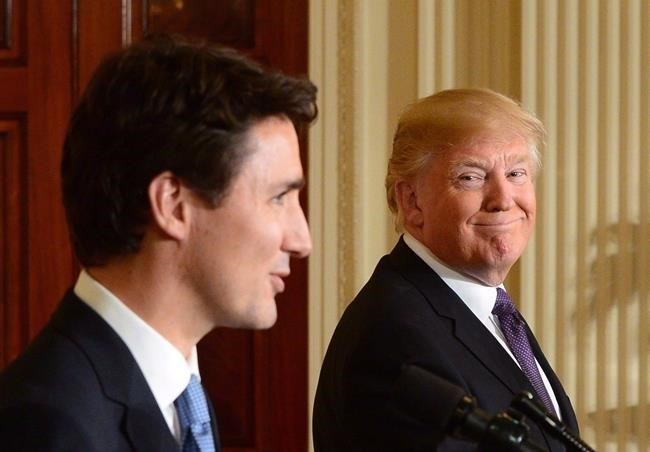
The Trump administration has been looking north lately for some guidance on policy-making. The latest example appears to be Canada's reform a generation ago of its air-traffic control system, which is now catching attention in Washington. Prime Minister Justin Trudeau and U.S. President Donald Trump take part in a joint press conference at the White House in Washington, D.C., in a February 13, 2017, file photo.
Image Credit: THE CANADIAN PRESS/Sean Kilpatrick
March 03, 2017 - 7:00 AM
WASHINGTON - The Trump administration has been looking north lately for some guidance on policy-making. The latest example appears to be Canada's reform a generation ago of its air-traffic control system, which is now catching attention in Washington.
This is after President Donald Trump used a prime-time address this week to tout Canada's skills-based immigration system as a possible model for the U.S. He also spoke about blending public and private funding for instrastructure, an ongoing Canadian initiative.
The president even interjected during Prime Minister Justin Trudeau's visit to the White House last month, when someone at a meeting mentioned Canada's public-private funding model for infrastructure.
"He looked around the table and said, 'Is that a better system than what we have?'" said Annette Verschuren, CEO of NRStor Inc., who was among the participants at a meeting of women's business leaders with Trudeau, Trump, and his daughter Ivanka.
A few days ago the Canadian government offered to share its experience with a law mandating that one regulation be chopped for every new one added, now that Trump has ordered an even more aggressive two-for-one cut.
Now the U.S. government is asking about Canada's 1996 transfer of air-traffic control to a non-government body.
It came up during a visit to Washington this week by Transport Minister Marc Garneau, who said his U.S. colleagues are keen to know more about the creation of Nav Canada and are planning a fact-finding trip to Ottawa.
Two decades ago, Canada hived off its air-traffic system into a privately run, non-profit corporation under the argument that government should not simultaneously be the regulator and practitioner of air-traffic control.
Garneau told reporters several people raised that during his two-day Washington visit.
"Nav Can has drawn interest from the United States," said Garneau, who also chairs the federal cabinet committee in charge of Canada-U.S. relations.
"Several (people) mentioned that they'd be interested in learning more about how we in Canada made the decision to separate the two functions — and to learn about how that has gone for Canada. It's gone very well for Canada. Nav Can is widely admired in terms of its efficiency...
"Of course, we indicated that (we'd do) anything we could to help there."
One thing that didn't come up during Garneau's trip: Clarity on what's happening with NAFTA.
Members of Congress have expressed befuddlement in recent days about when the president might launch the negotiation process — let alone what the substance of the negotiation might look like.
The White House needs to provide 90 days' notice to Congress before a trade negotiation, and consult with its members on what negotiating positions to adopt. On Capitol Hill, however, lawmakers told The Canadian Press this week they were still in the dark on those plans.
Garneau met five lawmakers and his U.S. counterpart, Transportation Secretary Elaine Chao. And after those meetings, there wasn't much more clarity — either about what the U.S. might seek, or when it might launch the process.
It's unclear whether Trump will launch the process now that his commerce secretary has been confirmed or wait for other pieces to fall into place, including tax reform and the problem-plagued confirmation of his trade representative.
"Everybody is waiting for that (90-day trigger) to happen. It has not happened yet," Garneau said. "The content (of the possible negotiations) at this point is not something we're familiar with — what the United States may be wanting to bring up."
The former astronaut met ex-colleagues during his trip.
One he saw in person — Bill Nelson, an old NASA colleague and now U.S. senator from Florida. Others Garneau met in a virtual side-trip he took Thursday to a location far, far away: outer space.
Garneau attended a conference which featured a video link to the International Space Station, and the ex-astronaut interviewed his orbiting peers in front of the event audience.
Via video, he asked U.S. astronauts Shane Kimbrough and Peggy Whitson questions like how they trained for their mission. They told him about their 12-hour workdays and about how they're experimenting with stem cells and growing lettuce in space — laying the groundwork, in a literal sense, for more distant extra-planetary missions of the future.
Garneau asked Whitson, whom he knew from his astronaut days: "I have to say I'm curious — how did that lettuce taste?"
She replied: "It was outstanding."
News from © The Canadian Press, 2017